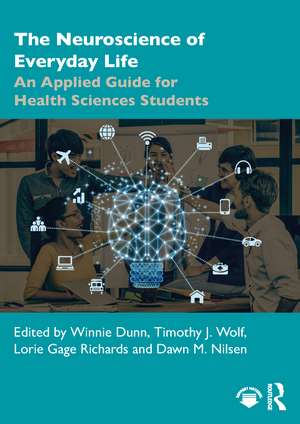The Neuroscience of Everyday Life: An Applied Guide for Health Sciences Students
Editat de Winnie Dunn, Timothy J. Wolf, Lorie Gage Richards, Dawn M. Nilsenen Limba Engleză Paperback – 22 ian 2025
Each chapter begins with the story of a person or family, including a description of what they want to do in their everyday life, before presenting the neuroscientific principles that underlie this person’s situation. Rather than a technical book about neuroanatomy, physiology or pathology, the spotlight is on understanding the way that neurological differences impact a person’s life. Through focusing on a particular condition, each chapter highlights a different aspect of the nervous system, and what happens when things change. A wide range of topics are covered, from conditions such as Parkinson’s, dementia, MS or autism, to conditions resulting from traumatic events such as spinal cord injuries, stroke or chronic pain. The goal of the book is to trace a thread from neuroscience to how the nervous system effects active participation in daily activities. This approach gives students and professionals a thorough and informed grounding to support problem-solving in practice, improving evidence-based assessment, interventions, and outcomes.
Following current evidence-based teaching practices, this text emphasizes engaged teaching/ learning methods throughout each chapter to encourage students’ own active discovery. This ground-breaking text will be essential reading for any health science students as well as professionals in practice.
| Toate formatele și edițiile | Preț | Express |
|---|---|---|
| Paperback (1) | 391.82 lei 3-5 săpt. | +25.69 lei 6-12 zile |
| Taylor & Francis – 22 ian 2025 | 391.82 lei 3-5 săpt. | +25.69 lei 6-12 zile |
| Hardback (1) | 1007.15 lei 6-8 săpt. | |
| Taylor & Francis – 22 ian 2025 | 1007.15 lei 6-8 săpt. |
Preț: 391.82 lei
Preț vechi: 425.89 lei
-8% Nou
Puncte Express: 588
Preț estimativ în valută:
74.97€ • 78.28$ • 62.05£
74.97€ • 78.28$ • 62.05£
Carte disponibilă
Livrare economică 14-28 martie
Livrare express 27 februarie-05 martie pentru 35.68 lei
Preluare comenzi: 021 569.72.76
Specificații
ISBN-13: 9781638221265
ISBN-10: 163822126X
Pagini: 320
Ilustrații: 56
Dimensiuni: 174 x 246 x 21 mm
Greutate: 0.59 kg
Ediția:1
Editura: Taylor & Francis
Colecția Routledge
Locul publicării:Oxford, United Kingdom
ISBN-10: 163822126X
Pagini: 320
Ilustrații: 56
Dimensiuni: 174 x 246 x 21 mm
Greutate: 0.59 kg
Ediția:1
Editura: Taylor & Francis
Colecția Routledge
Locul publicării:Oxford, United Kingdom
Public țintă
Professional Practice & Development, Undergraduate Advanced, and Undergraduate CoreCuprins
Part I: SENSORIMOTOR SYSTEMS. 1.Alex wants to put on make-up and has Bell’s Palsy. Neuroscience facilitates our understanding of self-care routines. 2 .Omar wants to cook meals for his children and has Myasthenia Gravis Neuroscience facilitates our understanding of self-care routines. 3.Danea wants to complete personal hygiene to go out with friends and has a spinal cord injury Neuroscience facilitates our understanding of personal hygiene. 4.Thomas wants to stay connected using a computer and has Multiple Sclerosis Neuroscience facilitates our understanding of computer use. 5.Erna wants to clean her home and has Cerebral Palsy Neuroscience facilitates our understanding of home maintenance. 6.Stella wants to garden and has Friedreich’s Ataxia Neuroscience facilitates our understanding of participation in hobbies. 7.Torrance is an autistic adult who wants to be successful in their new job. Neuroscience facilitates our understanding of workplace modifications. 8.Branden wants to run errands and is blind. Neuroscience Facilitates our Understanding of Running Errands. 9.Chloe wants to be successful entering college and has Meniere’s disease. Neuroscience facilitates our understanding of attending college. 10.Lydia wants to volunteer and has fibromyalgia. Neuroscience facilitates our understanding of volunteering. Part II: SOCIAL EMOTIONAL SYSTEMS. 11.Kareem wants to be in a club and has autism Neuroscience facilitates our understanding of making friends. 12.Ian wants to manage his money and has Schizophrenia Neuroscience facilitates our understanding of money management. 13.Alyssa wants to go out with friends and has anxiety Neuroscience facilitates our understanding of going out with friends. 14.Abraham wants to fish and has depression. Neuroscience facilitates our understanding of learning a new activity. 15.Sonya wants to care for her children and has bipolar disorder Neuroscience facilitates our understanding of caring for children. 16.Preston wants to reconnect with his children and is in recovery from addiction. Neuroscience facilitates our understanding of family dynamics. Part III: COGNITIVE SYSTEMS. 17.Peter wants to build a playhouse for his siblings and has ADHD Neuroscience facilitates our understanding of task completion. 18.Marcus wants to interact with friends via social media and has a developmental language disorder Neuroscience facilitates our understanding of social media use. 19.Paul wants to participate in his routine at home Neuroscience facilitates our understanding of place and routines. 20.Louise wants to organize her schedule and routines and has breast cancer Neuroscience facilitates our understanding of life organization. Part IV: INTEGRATED SYSTEMS. 21.Xavier wants to complete his personal hygiene by himself and has had a stroke. Neuroscience facilitates our understanding of daily routines. 22.Natalie Wants to Drive Her Car and has a Traumatic Brain Injury How Neuroscience Facilitates our Understanding of Driving a Car. 23.Antoine is a 67-year-old who Desires to Play with Grandchildren and has Parkinson’s Disease Neuroscience Facilitates our Understanding of Playing with Grandchildren.
Notă biografică
Winnie Dunn, Distinguished Professor, Occupational Therapy, University of Missouri, USA
Tim J. Wolf, Associate Dean for Research, Chair Occupational Therapy University of Missouri, USA
Lorie Richards, Associate Professor, Chair, Occupational Therapy, University of Utah, USA
Dawn M. Nilsen, Professor and Director, Programs in Occupational Therapy, Columbia University, USA
Tim J. Wolf, Associate Dean for Research, Chair Occupational Therapy University of Missouri, USA
Lorie Richards, Associate Professor, Chair, Occupational Therapy, University of Utah, USA
Dawn M. Nilsen, Professor and Director, Programs in Occupational Therapy, Columbia University, USA
Descriere
By weaving vignettes and case studies throughout, this fascinating and original textbook provides an accessible primer not only on the key principles of neuroscience but, crucially, how they may manifest in the everyday lives of people with neurological conditions.
